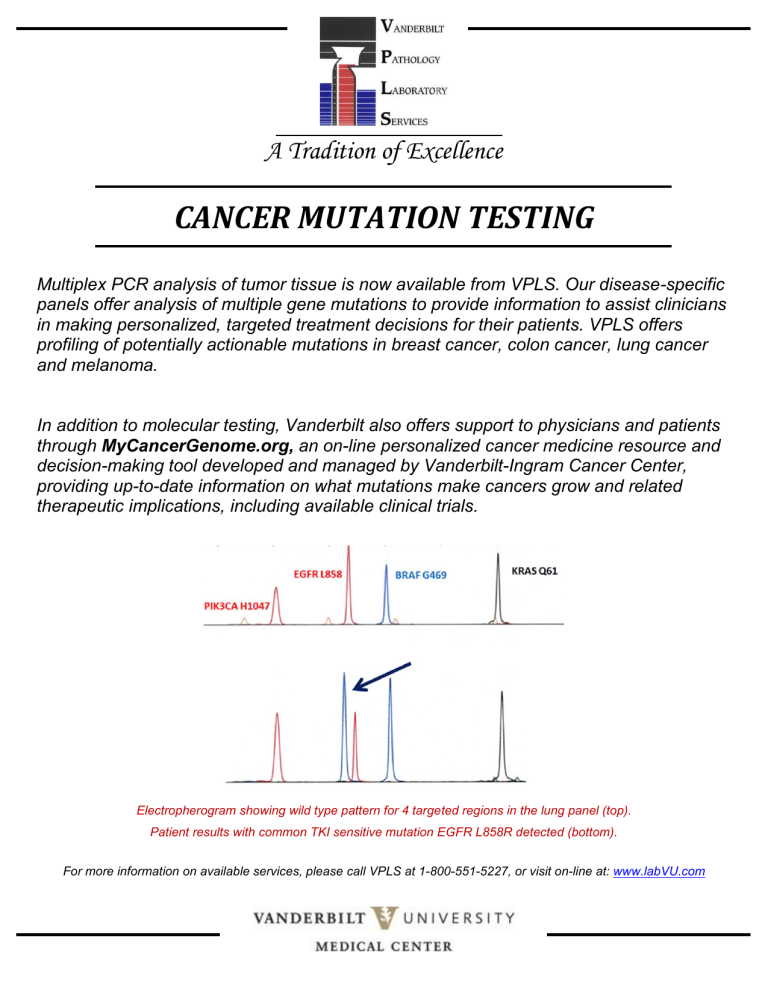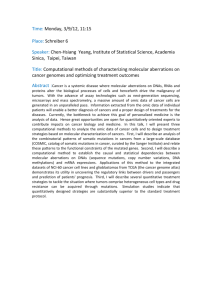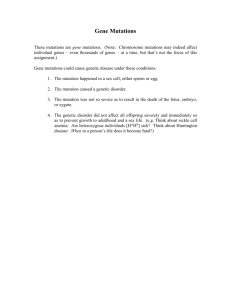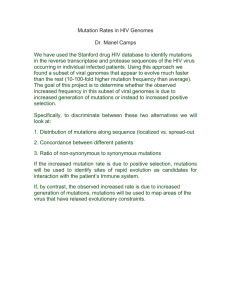CANCER MUTATION TESTING A Tradition of Excellence

A Tradition of Excellence
CANCER MUTATION TESTING
Multiplex PCR analysis of tumor tissue is now available from VPLS. Our disease-specific panels offer analysis of multiple gene mutations to provide information to assist clinicians in making personalized, targeted treatment decisions for their patients. VPLS offers profiling of potentially actionable mutations in breast cancer, colon cancer, lung cancer and melanoma.
In addition to molecular testing, Vanderbilt also offers support to physicians and patients through MyCancerGenome.org, an on-line personalized cancer medicine resource and decision-making tool developed and managed by Vanderbilt-Ingram Cancer Center, providing up-to-date information on what mutations make cancers grow and related therapeutic implications, including available clinical trials.
Electropherogram showing wild type pattern for 4 targeted regions in the lung panel (top).
Patient results with common TKI sensitive mutation EGFR L858R detected (bottom).
For more information on available services, please call VPLS at 1-800-551-5227, or visit on-line at: www.labVU.com
CANCER MUTATION TESTING
A Tradition of Excellence
VPLS is pleased to offer the Cancer Mutation Testing services available from the Vanderbilt Molecular Diagnostics
Laboratory. VPLS will work with your institution to provide the highest quality services to your patients and physicians.
MOLECULAR PROFILING OF MELANOMA
Historically, melanoma has been classified according to pathologic and clinical characteristics such as histology (depth,
Clark level, ulceration) and anatomic site of origin. Over the past decade, it has become evident that subsets of melanoma can be further defined at the molecular level by recurrent 'driver' mutations that occur in multiple oncogenes. Such 'driver' mutations lead to constitutive activation of mutant signaling proteins that induce and sustain tumorigenesis. Current testing at Vanderbilt includes profiling of mutations in BRAF , CTNNB1 , GNA11 , GNAQ , KIT , and NRAS .
MOLECULAR PROFILING OF LUNG CANCER
Lung cancer is the leading cause of cancer related mortality in the United States, with an estimated 226,160 new cases and
160,340 deaths anticipated in 2012 ( ACS 2012 ). Lung cancer is comprised of two main histologic subtypes: non-small cell lung cancer (NSCLC) and small cell lung cancer (SCLC). Over the past decade, it has become evident that subsets of
NSCLC can be further defined at the molecular level by recurrent 'driver' mutations that occur in multiple oncogenes.
Current testing at Vanderbilt includes profiling of mutations in AKT1 , BRAF , EGFR , HER2 , KRAS , MEK1 , NRAS , and
PIK3CA .
MOLECULAR PROFILING OF COLON CANCER
Colorectal cancer is the second leading cause of cancer related mortality in the United States, with an estimated 143,460 new cases and 51,690 deaths anticipated in 2012 ( ACS 2012 ).
The main histologic subtype of colorectal cancer is adenocarcinoma. Colorectal adenocarcinomas arise through the acquisition of a series of mutations that occur over the space of many years, and results in the evolution of normal epithelium to adenoma to carcinoma to metastasis ( Fearon and
Vogelstein 1990 ). In the past two decades, there has been increasing recognition that some somatic mutations may be prognostic or predictive markers for specific therapies available in colorectal cancer. Current testing at Vanderbilt includes profiling of mutations in KRAS , BRAF , PIK3CA , AKT1 , SMAD4 , PTEN and NRAS .
MOLECULAR PROFILING OF BREAST CANCER
Breast cancer is the most frequently diagnosed cancer and the leading cause of cancer death in females worldwide.
In the
U.S., 229,060 new cases and 39,920 deaths are estimated for 2012 ( ACS 2012 ). Both genetic and biochemical data suggest that activation of the PI3K/AKT survival pathway contributes to breast cancer development and tumorigenesis.
PIK3CA mutations in primary breast tumors have been associated with lymph node metastases, presence of ER and PR, and HER2 overexpression ( Saal et al. 2005 ; Stemke-Hale et al. 2008 ) . Current testing at Vanderbilt includes profiling of mutations in PIK3CA , AKT1 and PTEN .
TEST METHODOLOGY
Multiplex PCR followed by multiplex base extension assay utilizing the SNaPshot
TM
methodology.
Amplicons are detected using capillary electrophoresis.
SAMPLE REQUIREMENTS
Paraffin Embedded Tissue Block – Contact VPLS for specific panel information and sample requirements.
RESULT REPORTING
A complete mutation report is provided for each sample.
Additional clinical information is also available at www.MyCancerGenome.org
Please contact VPLS for specific panel CPT codes and prices.
VPLS provides your institution with all the necessary collection and transport supplies, reporting, billing and customer support services to facilitate your specimen referrals to Vanderbilt.
For more information on available services, please call VPLS at 1-800-551-5227 x4, or visit on-line at: www.labVU.com






